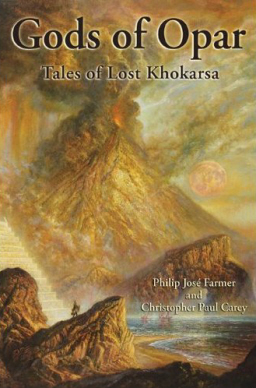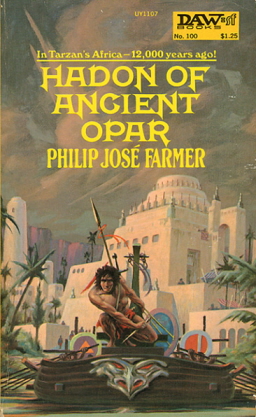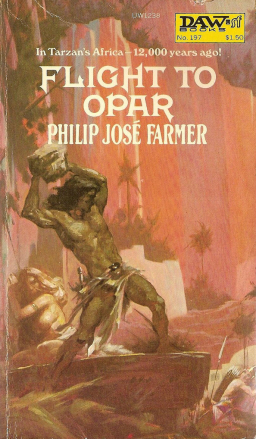Christopher Paul Carey on Gods of Opar: Tales of Lost Khokarsa
 In July 2005, I was alerted to an amazing find: the partial manuscript and detailed outline to Philip José Farmer’s third Khokarsa novel had been located among the author’s files.
In July 2005, I was alerted to an amazing find: the partial manuscript and detailed outline to Philip José Farmer’s third Khokarsa novel had been located among the author’s files.
At the time, I was serving as editor of Farmerphile, an authorized, digest-sized magazine devoted to bringing into print rarities and previously unpublished material by Farmer, and so naturally I had been contacted by the magazine’s publisher, Michael Croteau, when the new Khokarsa material turned up.
I was a huge fan of the original two books in the cycle — Hadon of Ancient Opar (1974) and Flight to Opar (1976) — considering them to be at the highest tier of Farmer’s adventure fiction, and it was with quivering fingers that I typed a reply to Mike’s email and requested a copy of the pages. When the photocopies promptly arrived, I was astounded. Here on an epic scale was the entire arc of what Farmer had planned for the third novel of the series, minus a few finishing touches where he had speculated on alternate courses for the story’s finale.
What’s more, the novel didn’t star Hadon, the duty-bound protagonist of the first two installments, but rather Hadon’s giant cousin Kwasin in all his larger-than-life stature — the wild, unrestrained antihero of the series, who was last seen on stage in Hadon of Ancient Opar, swinging his massive ax of meteoritic iron against impossible odds to give Hadon and his companions a chance to escape the forces of the power-hungry King Minruth.
It was a story that I instantly knew needed to be told — the conclusion to a trilogy for which Farmer’s fans had been waiting almost thirty years.
 [Click on any of the images in this article for larger versions.]
[Click on any of the images in this article for larger versions.]
By this time, Phil Farmer had retired from writing, and his health had been progressively declining in these latter years. But as recently as 1999 he’d made known his desire to complete the Khokarsa series, proclaiming that he would wrap up all the loose details in the third novel. This, of course, sadly never came to pass.
And so, in perhaps one of the most daring, bullet-sweating moves of my life, I drew up a comprehensive proposal to complete the third novel. I’d known Phil since 1998, and we both shared a keen interest in anthropology and a deep love of the pulps — in particular, Burroughs and Haggard, who’d inspired the series — so this was not completely out of the blue.
One of the reasons I was involved with Farmerphile was because Phil was familiar with my articles on his work, and he’d told me and others that he thought highly of them (one of these saw print later that same year in the anthology Myths for the Modern Age: Philip José Farmer’s Wold Newton Universe).
And so Phil carefully read my proposal and wrote back to me with great enthusiasm, and to my overwhelming awe granted me permission to proceed, closing his letter with the imperative “forward it is.” I was beside myself when I received the news and eager to get started. But I was attending graduate school at this point, so it was about a year and a half before I could begin work in earnest on the novel (Phil and his wife Bette knew this from the outset, and insisted that I finish my degree before launching into the project).
The first draft of The Song of Kwasin was completed in early 2008. Phil’s health had by now taken a turn for the worse, but Bette Farmer had been reading her husband chapters of the book as I completed them, and I was overjoyed by her descriptions of how Phil lit up at hearing of the giant Kwasin’s adventures. Then, while visiting Phil in celebration of his ninety-first birthday in January 2009, I uncovered another trove of Khokarsa materials in the files (which we had affectionately begun to call the Magic Filing Cabinet because of its propensity to offer up new wonders just when we thought we’d explored it all). This was in addition to the copious notes related to the series that Phil had generously opened to me while I was writing the first draft of the novel.
 The newly found materials included Phil’s complete Khokarsan syllabary and several drafts of a detailed article on Khokarsan linguistics — truly Tolkienesque world building, as Phil was passionate about linguistics, and in fact, was just a few credits shy of holding a Master’s degree in the subject. The information in these archives allowed me to sync up the names I had to create for the novel with the rules of the Khokarsan language, as well as to revise those placeholder names Phil had hastily typed in his outline with notes to “check the syllabary.”
The newly found materials included Phil’s complete Khokarsan syllabary and several drafts of a detailed article on Khokarsan linguistics — truly Tolkienesque world building, as Phil was passionate about linguistics, and in fact, was just a few credits shy of holding a Master’s degree in the subject. The information in these archives allowed me to sync up the names I had to create for the novel with the rules of the Khokarsan language, as well as to revise those placeholder names Phil had hastily typed in his outline with notes to “check the syllabary.”
It was a long road to publication for the third novel, The Song of Kwasin, and Phil sadly passed away before he could see the printed book. But I’m excited to announce to the fans that the long wait is at last over and all three novels of the Khokarsa series are now available in the omnibus Gods of Opar: Tales of Lost Khokarsa.
The book features a stunning wraparound apocalyptic dust jacket illustration by the amazing Bob Eggleton. The limited edition also includes a section of bonus material that gives the reader a good glimpse into the outline, notes, and articles written by Farmer in the 1970s and preserved in his files.
I encourage readers interested in further exploring the world of Khokarsa to visit the Lost Khokarsa website, which features a wealth of information on the series, including exclusive material from Philip José Farmer’s literary papers.
Christopher Paul Carey is the coauthor with Philip José Farmer of Gods of Opar: Tales of Lost Khokarsa.
He is an editor with Paizo Publishing and the award-winning Pathfinder Roleplaying Game, and the editor of three collections of Philip José Farmer’s work: Up from the Bottomless Pit and Other Stories, Venus on the Half-Shell and Others, and The Other in the Mirror.
His short fiction may be found in such anthologies as The Worlds of Philip José Farmer, Tales of the Shadowmen, and The Avenger: The Justice, Inc. Files.
Visit him online at www.cpcarey.com.
Yikes! High price but I’ll get it. I hope it comes to Kindle or Nook soon. I have only one book in this series and it was excellent and now it is near impossible to find where I am at. I rediscovered Farmer’s work and I’d like a closer inspection of how he crafts worlds, outlines. Funny thing is I’m also taking a linquistics course and it is fascinating so I can see why it adds to Farmer’s world building. Thank you for bringing this back with all the goodies.
I loved the first two books when I was growing up. I wish you luck in introducing a whole new generation to the works!
Wild Ape: Yes, I have a degree in anthropology and was blown away by the depth of thought Phil Farmer put into the Khokarsan language (there’s an in-depth article by Phil on the subject in the Limited Edition, which is unfortunately sold out).
No plans for a Kindle or Nook yet, though Titan Books has recently acquired the rights to HADON OF ANCIENT OPAR and will be publishing it next year in both paperback and ebook editions. They haven’t acquired the other two books in the series, but I’m hoping they might.
As far as price, Subterranean puts together a high-quality package that’s well worth the list price. You might check Amazon, though, as they’ve periodically offered it at a discount.
And you’re welcome! It was a lot of work getting the series back into print, but it was one of the great honors of my life.
Thanks, peadarog!
[…] Black Gate (Christopher Paul Carey) on Gods of Opar: Tales of Lost Khokarsa. […]
[…] the publication of Gods of Opar: Tales of Lost Khokarsa, I thought I’d take the opportunity to give Black Gate readers a taste of the world of Khokarsa, […]
[…] many SF series, including Riverworld, World of Tiers, Dayworld, Khokarsa (which we recently covered here), his Tarzan, Lord Grandrith and Doc Caliban books, and […]
[…] of Kwasin, by Philip José Farmer and Christopher Paul Carey (Black Gate recently ran essays from Carey about the history of his remarkable collaboration with Farmer, and his discussion of Farmer’s ambitious creation, the lost civilization of […]
[…] Bear God” relates a missing chapter in the giant Kwasin’s adventures. After I completed writing The Song of Kwasin based on Phil Farmer’s outline and partial manuscript, I discovered another, unused outline in […]
[…] of Kwasin, by Philip José Farmer and Christopher Paul Carey (Black Gate recently ran essays from Carey about the history of his remarkable collaboration with Farmer, and his discussion of Farmer’s ambitious creation, the lost civilization of […]
[…] Bear God” relates a missing chapter in the giant Kwasin’s adventures. After I completed writing The Song of Kwasin based on Phil Farmer’s outline and partial manuscript, I discovered another, unused outline in […]